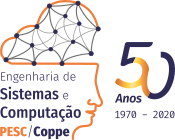Offloading de Aplicações Estruturadas como DAGs para a Borda da Rede
Autores
|
7420 |
3225,883,163
|
|
|
7421 |
3225,883,163
|
|
|
7422 |
3225,883,163
|
Informações:
Publicações do PESC
O avanço tecnológico recente impulsiona o surgimento de novas aplicações, tais como jogos e streaming de vídeo, que apresentam requisitos intensivos de processamento, latência etc. Executar essas aplicações pode não ser viável nem no dispositivo móvel de usuário, devido a limitações de hardware, e nem na nuvem, devido à latência. Uma solução para isso é a computação de borda, um paradigma emergente no qual as aplicações são executadas em servidores de borda, próximos do usuário, podendo reduzir seu tempo de conclusão (makespan). No entanto, o descarregamento (offloading) de aplicações por completo para o servidor de borda pode sobrecarregá-lo ou congestionar o canal de comunicação. Como as aplicações de rede podem ser estruturadas como tarefas e suas trocas de dados, formando Directed Acyclic Graphs (DAGs), o offloading pode ser feito para apenas parte das tarefas. Particionar aplicações em tarefas e escolher quais tarefas devem ou não ser offloaded é um problema difícil, que não se resolve em tempo polinomial. Esta tese propõe, portanto, a heurística Transmission-Avoiding fLexible OffloadiNg (TALON) para encontrar decisões de offloading com makespan baixo para DAGs genéricos. São extraídos 1322 DAGs realistas do Alibaba Cluster Trace Program, para os quais TALON busca decisões de offloading e é comparada à sua referência principal e a duas soluções triviais. O makespan alcançado por TALON está apenas 3,9% a 8,9% acima do makespan ótimo em todos os casos. Inclusive, no caso multiusuário, TALON atinge um makespan equivalente ao da referência principal utilizando oito vezes menos recursos. TALON também supera de longe as soluções triviais. Além disso, TALON não onera o servidor de borda, dividindo a execução entre o dispositivo móvel e a borda, tal qual a decisão ótima, com a qual TALON apresenta uma semelhança que chega a 87%.
Recent technological advances drive the emergence of new applications, such as gaming and video streaming, which have stringent requirements for processing, latency, etc. Processing these applications may not be feasible either on the user’s mobile device, due to its hardware limitations, or on the cloud, due to high latency. Edge computing is a possible solution to this, as it is an emerging paradigm in which applications run on edge servers, which are closer to the user, and it can reduce their completion time (makespan). However, transferring (offloading) applications’ execution entirely to the edge server can heavily burden it or congest the communication channel. As network applications can be structured as a set of tasks and their data transmissions, forming Directed Acyclic Graphs (DAGs), offloading can be done for only part of the tasks. The application partitioning into tasks and the decision about which tasks should or should not be offloaded is a difficult problem, which cannot be solved in polynomial time. Hence, this thesis proposes the heuristic Transmission-Avoiding fLexible OffloadiNg (TALON) to find offloading decisions with low makespan for generic DAGs. A set of 1322 realistic DAGs is extracted from Alibaba Cluster Trace Program, for which TALON makes offloading decisions, as TALON is compared with a main proposal from the literature and two baseline solutions. The makespan achieved by TALON is only 3.9% to 8.9% above the optimal makespan in all cases. In fact, in the multiuser case, TALON achieves a makespan equivalent to the one achieved by its competitor, but using eight times fewer resources than it. TALON also far outperforms the baseline solutions. Besides, TALON does not burden the edge server, balancing the task processing between the mobile device and the edge server, just like the optimal decision, with which TALON achieves up to 87% similarity.





